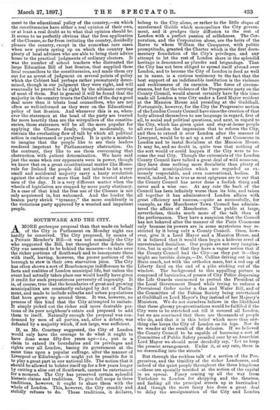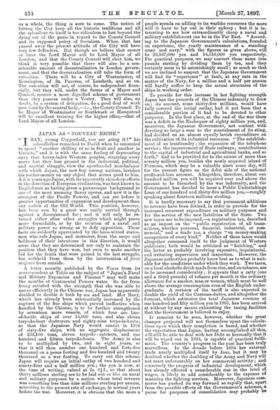SOUTHWARK AND THE CITY.
AMORE grotesque proposal than that made on behalf of the City in Parliament on Monday night can hardly be conceived. The City proposed, by means of a Private Member's Bill—it was not nominally the City who suggested the Bill, but throughout the debate the City was assumed to be behind the measure—to take over the richer portions of Southwark and to incorporate them with itself, leaving, however, the poorer portions of the borough to stew in their own starvation juice. The City has often shown a sort of Bourbonesque indifference to the facts and realities of London municipal life, but unless the event had actually taken place one would hardly have given it credit for such preposterous perversity of ingenuity. It is, of course, true that the boundaries of great and growing municipalities are constantly enlarged by Act of Parlia- ment, and made to include suburbs and urban populations that have grown up around them. It was, however, no process of this kind that the City attempted to imitate. It simply picked out the richer and more desirable por- tions of its poor neighbour's estate and proposed to add them to itself. Naturally enough the proposal was con- demned by men of all parties, and, after a debate, was defeated by a majority which, if not large, was sufficient.
If, as Mr. Courtney suggested, the City of London would only have the courage to do what it ought to have done some fifty-five years ago—i.e., put in a claim to extend its boundaries and its privileges and rights over all London, basing its government at the same time upon a popular suffrage, after the manner of Liverpool or Edinburgh—it might yet be possible for it to play a great part in our national life. The notion that it should be allowed to bolster itself up for a few years longer by cutting a slice out of Southwark, cannot be entertained for a moment. The City has preserved certain splendid historic claims and traditions. To give full scope to these traditions, however, it ought to share them with the 'whole of London. This, however, the City steadily and stolidly refuses to do. These traditions, it declares, belong to the City alone, or rather to the little clique of unreformed Guilds which monopolises the City govern- ment, and it grudges their diffusion to the rest of London with a. perfect passion of selfishness. The Cor- poration, and the Corporation alone, are the heirs of the Reeve to whom William the Conqueror, with politic promptitude, granted the Charter which is the first docu- mentary foundation of the City's privileges, and any attempt to let the rest of London share in the splendid heritage is denounced as plunder and brigandage. That the City has not been obliged to spread itself abroad over London, and to become the City of London in deed as well as in name, is a curious testimony to the fact that the best support of an indefensible institution is the violence and recklessness of its enemies. The force of circum- stances, but for the violence of the Progressive party on the County Council, would almost certainly have by this time made all London a true City under a Lord Mayor resident at the Mansion House and presiding at the Guildhall. Fortunately, however, for the City the Progressive section of the London County Council have since the creation of that body allowed themselves to use language in regard, first of all, to social and political questions, and next, in regard to the City, which has given quiet and stay-at-home people all over London the impression that to reform the City, and then to extend it over London after the manner of Liverpool, would be to set up a sort of vast Commune in. London and to instal Socialism at the Mansion House. It may be, and no doubt is, quite true that nothing of the sort would or could happen if the City were to be- come the real City. Though the extremists of the London. County Council have talked a great deal of wild nonsense,. they have done nothing more Socialistic than plenty of provincial municipalities which are regarded as ex- tremely respectable, and even conventional, bodies. It would, indeed, be as true as most epigrams are to say that the County Council has never done a foolish thing and never said a wise one. At any rate the bark of the Council has been infinitely worse than its bite, and taken all together it has administered London affairs with great efficiency and success,—quite as successfully, for example, as the Manchester Town Council has adminis- tered the affairs of Manchester. The public at large, nevertheless, thinks much more of the talk than of the performance. They have a suspicion that the Council has not behaved after the manner of the Paris Commune only because its powers are in some mysterious way re- stricted by it being only a County Council. Once, how- ever, give it a Lord Mayor and a Mansion House, and it is believed that it would then begin a hideous revel of unrestrained Socialism. Our people are not very imagina- tive, but in spite of that they have a vague notion that if the County Council had the City—as they put it—they might see terrible doings,—Dr. Collins driving out in the State coach, not with the orthodox mace, but a red cap of Liberty fixed on the end of a pike sticking out of the window. The background to this appalling picture is composed of barricades, of posses of City Police dispersing the Life Guards summoned to protect the President of the Local Government Board while trying to enforce a Provisional Order under a Gas and Water Bill, and of the Committee of the Fabian Society being entertained at Guildhall on Lord Mayor's Day instead of her Majesty's. Ministers. We do not ourselves believe in the likelihood that these gloomy prognostications would be fulfilled if the City were to be stretched out till it covered all London, but we are convinced that there are thousands of people who do, and that it is this belief which more than any- thing else keeps the City of London on its legs. Nor do we wonder at the result of the delusion. If we believed the County Council to be capable of becoming a sort of Committee of Public Safety presided over by an Anarchist Lord Mayor we should most decidedly say, ' Let us keep, the present arrangement. Under it, at any rate, there ia no descending into the streets.'
But through the reckless talk of a section of the Pro- gressives, and the timidity of the richer Londoners, and indeed of the quiet people throughout the three kingdoms —these are specially terrified at the notion of the capital in an uproar. Fancy coming up all the way from Yorkshire to London for shopping and the, theatres, and finding all the principal streets up in barricades! And though the mere fancy has done a great deal to delay the amalgamation of the City and London as a whole, the thing is sure to come. The notion of letting the City keep all the historic traditions and. all the splendour to itself is too ridiculous to last beyond the dying out of the panic in regard to the Colinty Council and its supposed policy of Socialism. When that has passed away the present attitude of the City will have very few defenders. But though we believe that sooner or later the Lord Mayor will be Lord Mayor of all London, and that the County Council will elect him, we think it very possible that there will also be a con- siderable amount of decentralisation in London govern- ment, and that the decentralisation will take the form of sub-cities. There will be a City of Westminster, of Kensington, of St. Pancras, of Lambeth, and so on. The sub-cities will not, of course, be independent finan- cially, but they will, under the forms of a Mayor and Council, receive a more dignified scheme of government than they possess under a Vestry. They will also, no doubt, by a system of delegation, do a good deal of work now done by the central body,—i.e., the County Council. To be Mayor of Westminster or Southwark or Hampstead will be excellent training for the higher office,—that of Lord Mayor of all London.







































 Previous page
Previous page